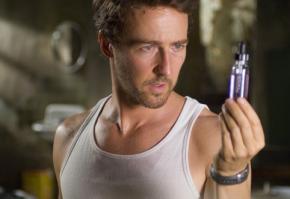Weapon of mass destruction
reviews the newest movie based on a Marvel comics favorite, The Incredible Hulk.
ON THE heels of the well-made and highly entertaining Iron Man, Marvel Studios scores another success with The Incredible Hulk; the movie delivers the typical summer blockbuster fare of chase scenes, explosions and a climactic battle, while also managing to capture the many nuances of the Bruce Banner/Hulk personae that has made the character an iconic figure for over 40 years.
The Incredible Hulk was historically one of the more complex characters in the Marvel Comics universe. In the comics version, Bruce Banner was a nuclear scientist working to develop a "gamma bomb" for the U.S. Army. In a tragic accident, he was caught in a bomb test and instead of being incinerated was given superpowers (freak radiation accidents granting superpowers were fairly common coin in this fictional universe).
The Hulk's original origin reflected the impact of the Cold War arms race and America's obsession with atomic power: radiation makes one powerful, and in some cases god-like. Also, with the Russians in possession of the hydrogen bomb, Banner's role as the builder of a better bomb is plausible. Moreover, the "Russians as enemy" plotline gets continued throughout the history of the comic: Emil Blonsky, a major villain in this film, was written as a Russian spy.
The movie changes this dated origin: in this story, the Hulk is the product of an unethical "super-soldier" program cooked up by the General Thaddeus Ross (comic readers will recognize this program as the one that created Captain America). The Hulk is literally a weapon of mass destruction created by the U.S. Army.
Like Frankenstein's monster and the figure of Dr. Jekyll and Mr. Hyde, the Hulk is a creation of science gone awry. The central conflict of the film is the Army's attempt to retrieve Banner against his will in order to use his gamma-radiated blood to create more biological weapons.
Even the most demanding moviegoer can find relief in Ross' irredeemably villainous behavior: he stops at nothing, including using his own daughter as bait, in order to trap Banner. It is his lack of humanity, contrasted with Banner's attempts to tame the monster lurking within, that makes the film so compelling. The U.S. Army, personified by Ross, comes across as reckless, dangerous and immoral throughout, unlike its savior image from Iron Man.

Ross' recklessness is most on display as he turns British commando Blonsky into a monster on par with the Hulk (this version of Blonsky was Russian-born, continuing the "Russians=villain" theme). Of course, Blonsky turns on his creator (who meddled with forces beyond his control or understanding) and proceeds to lay waste to Manhattan. It is only the intervention of the Hulk that saves the day.
Of course, Blonsky is not the victim in this madness: he begs Ross to make him more powerful, and the latter happily obliges. Ross' dream was an army of Hulks subject to army discipline: Blonsky was merely a more loyal and compliant test subject than Banner. Predictably, Blonsky becomes intoxicated with the degree of power he gains from Ross, and craves more, to the point of literally becoming an abomination.
Blonsky and Banner also make for quite the contrast: the former becomes fixed in his monstrous form where he wholly retains his gung-ho mentality. Banner retains his ability to change into a human, and his Hulk persona is more humanoid in appearance, despite being limited in intelligence. One of the interesting developments in the film is Banner's growing degree of consciousness within his Hulk personality.
THERE ARE many reasons for the Hulk's ongoing popularity. One is that it wrestles with the central dilemma of our age: for what ends will humankind's vast productive and technological forces be harnessed? For destruction and the degradation of human beings into objects or monsters? Or, for the first time, into fully human subjects?
The movie cannot answer this question, but it at least gets posed by Dr. Samuel Sterns, who refers to the "Promethean" potential of Banner's blood. Sterns, however, shows himself to be another Dr. Frankenstein like General Ross, as he acts without concern for the potentially devastating implications of his research.
Another important theme of the Hulk is the dehumanizing effect of capitalism. The comics have always viewed the Hulk as a repository for Banner's frustrated and repressed emotions, a theme the movie explores well, very much in the spirit of Jekyll and Hyde. It is noteworthy that the first scene in which Banner transforms into the Hulk is in a factory, the venue of capitalist oppression.
Banner, like many workers under capitalism, has his humanity distorted and crippled by the alienating pressures of capitalist society: this is clearly the case for Banner, as he is unable to feel a myriad of emotions, such as rage or sexual desire, as a human being without dangerous consequences.
Although highly entertaining, the film is not devoid of weaknesses. Tim Roth is frankly not physically imposing enough to be believable as an ace British commando. Additionally, Edward Norton plays a more confident and extroverted Bruce Banner than readers of the comic would expect. On the other hand, John Hurt delivers a fine performance as General Ross, as does Liv Tyler as Betty Ross.
Overall, while it is expecting too much from a movie based on a comic book to serve as an indictment of American imperialism, The Incredible Hulk does accurately capture the amoral and villainous nature of the military's hierarchal food chain, while providing plenty of thrills and well-rounded characters for the price of admission.


